




suggested donation goes directly to your vendor STREETSENSEMEDIA.ORG @ STREETSENSEDC Real Stories Real People Real Change $2VOL. 19 ISSUE 49 OCTOBER 26 - NOVEMBER 1, 2022 Happy Halloween! companies to pay historic $10 million fine for voucher discrimination What WE can learn from tiny homeS 3 6 8 WHY DC HAS ONLY USED LESS THAN A QUARTER OF ITS HOUSING VOUCHERS
Sense Media
Each
Street Sense Media,
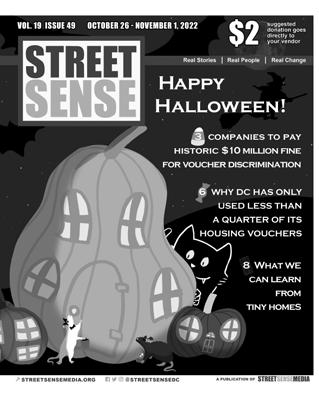
business
their
1317 G Street NW, Washington, DC 20005 (202) 347 - 2006 streetsensemedia.org info@streetsensemedia.org
VENDORS
Abel Putu, Abraham Aly, Aida Peery, Amina Washington, Andre Brinson, Andrew Anderson, Angie Whitehurst, Anthony Carney, Anthony Pratt, Archie Thomas, August Mallory, Betty Everett, Beverly Sutton, Bob Davis, Brianna Butler, Brandon Archer, Candice Wilkes, Carlos Carolina, Carlton Johnson, Carol Motley, Charles Armstrong, Charles Woods, Chon Gotti, Chris Cole, Chris Sellman, Conrad Cheek, Corey Sanders, Cortney Signor, Daniel Ball, David Snyder, Debora Brantley, Degnon (Gigi) Dovonou, Don Gardner, Donté Turner, Doris Robinson, Earl Parker, Eric Glover, Eric Thompson-Bey, Erica Downing, Evelyn Nnam, Floyd Carter, Franklin Sterling, Frederic John, Fredrick Jewell, Gerald Anderson, Gracias Garcias, Henry Johnson, Ivory Wilson, Jacqueline “Jackie” Turner, Jacquelyn Portee, James Davis, Jeanette Richardson, Jeff Taylor, Jeffery McNeil, Jeffrey Carter, Jemel Fleming, Jenkins Daltton, Jennifer McLaughlin, Jermale McKnight, Jet Flegette, Jewel Lewis, John Littlejohn, Joshua Faison, Juliene Kengnie, Justin Blakey, Katrina Arninge, Kenneth Middleton, Khadijah Chapman, Kym Parker, L. Morrow, Laticia Brock, Laura Smith, Lawrence Autry, Levester Green, Malcolm Scott Jr, Marcus McCall, Mark Jones, Mango Redbook, Maurice Spears, Melody Byrd, Michael Warner, Michelle Mozee, Michele Rochon, Mildred M. Hall, Morgan Jones, Patricia Donaldson, Patty Smith, Phillip Black, Queenie Featherstone, Reggie Jones, Reginald Black, Reginald C. Denny, Ricardo Meriedy, Rita Sauls, Robert Warren, Rochelle Walker, Ron Dudley, Sasha Williams, Shawon McCrary, Sheila White, Shuhratjon Ahmadjonov, Susan Westmoreland, Susan Wilshusen, Sybil Taylor, Warren Stevens, Wendell Williams
BOARD OF DIRECTORS
Mary Coller Albert, Blake Androff, Jonquilyn Hill, Greg Jaffe, Stanley Keeve, Clare Krupin, Ashley McMaster, Matt Perra, Michael Phillips, Daniel Webber, Shari Wilson, Corrine Yu
CHIEF EXECUTIVE OFFICER
Brian Carome
DIRECTOR OF DEVELOPMENT AND COMMUNICATIONS
Doris Warrell
DIRECTOR OF PROGRAMS Darick Brown
VENDOR CODE OF CONDUCT
As self-employed contractors, our vendors follow a code of conduct.

1. I will support Street Sense Media’s mission statement and in so doing will work to support the Street Sense Media community and uphold its values of honesty, respect, support, and opportunity.
2. I will treat all others, including customers, staff, volunteers, and fellow vendors, respectfully at all times. I will refrain from threatening others, pressuring customers into making donations, or engaging in behavior that condones racism, sexism, classism, or other prejudices.
3. I understand that I am not an employee of Street Sense Media but an independent contractor.
4. While distributing the Street Sense newspaper, I will not ask for more than $2 per issue or solicit donations by any other means.
5. I will only purchase the newspaper from Street Sense Media staff and volunteers and will not distribute newspapers to other vendors.
6. “I will not distribute copies of “Street Sense” on metro trains and buses or on private property.”
7. I will abide by the Street Sense Media Vendor Territory Policy at all times and will resolve any related disputes with other vendors in a professional manner.
8. I will not sell additional goods or products while distributing “Street Sense.”

9. I will not distribute “Street Sense” under the influence of drugs or alcohol.
10. I understand that my badge and vest are property of Street Sense Media and will not deface them. I will present my badge when purchasing “Street Sense” and will always display my badge when distributing “Street Sense.”
#MoreThanANewspaper
Originally founded as a street newspaper in 2003, Street Sense Media has evolved into a multimedia center using a range of creative platforms to spotlight
to homelessness and empower people in need. The men and women who work with us do much more than sell this paper: They use film, photography, theatre, illustration, and more to share their stories with our community.
Our media channels elevate voices, our newspaper vendor and digital marketing programs provide economic independence. And our in-house case-management services move people forward along the path toward permanent supportive housing.
At Street Sense Media, we define ourselves through our work, talents, and character, not through our housing situation.
DIRECTOR OF VENDOR EMPLOYMENT Thomas Ratliff
VENDOR PROGRAM ASSOCIATES Aida Peery, Clifford Samuels
VENDOR PROGRAM VOLUNTEERS Roberta Haber, Ann Herzog, Madeleine McCollough, Dylan Onderdonksnow
MANAGER OF ARTISTIC WORKSHOPS Maria Lares
EDITOR-IN-CHIEF Will Schick
DEPUTY EDITOR Kaela Roeder
PRODUCTION EDITOR Athiyah Azeem
STAFF REPORTER Annemarie Cuccia
EDITORIAL INTERN Neil Franklin
MICHAEL STOOPS DIVERSITY FELLOW Sophia Thomas
ARTISTS-IN-RESIDENCE
Ariane Mohseni (Film), Bonnie Naradzay (Poetry), David Serota (Illustration), Lalita Clozel (Film), Willie Schatz (Writing)
ARTS EDITOR (VOLUNTEER) Austine Model
OPINION EDITORS (VOLUNTEER) Rebecca Koenig, Emily Kopp, Lydia DePillis, Bill Meincke, Candace Montague
EDITORIAL VOLUNTEERS
Josh Axelrod, Ryan Bacic, Katie Bemb, Lilah Burke, Chelsea Ciruzzo, Lenika Cruz, Alison Henry, Kathryn Owens, Nick Shedd, Andrew Siddons, Jenny-lin Smith, Rebecca Stekol
2 // STREET SENSE MEDIA // OCTOBER 26 - NOVEMBER 1, 2022
INTERESTED IN BEING A VENDOR? New vendor training: every Tuesday and Thursday // 2 p.m. // 1317 G St., NW NO CASH? NO PROBLEM. How It Works
vendor functions as an independent contractor for
managing their own
to earn an income and increase stability in
life. Street
publishes the newspaper BUSINESS MODEL YOUR SUGGESTED $2.00 DONATION goes directly to your vendor, empowering them to overcome homelessness and poverty per newspaper copy $.50 Vendors pay Pay vendors with the Street Sense Media app! S earch “S treet S en S e ” in your app S tore . AVAILABLE The Street Sense Media Story,
solutions
The Cover Happy Halloween! COVER ART BY ATHIYAH AZEEM © STREET SENSE MEDIA 2003 - 2022
NEWS IN BRIEF AT A GLANCE VENDOR PROGRAM ANNOUNCEMENTS
DC companies will pay historic fine for discriminating against people with vouchers
ANNEMARIE CUCCIA Staff Reporter
Three D.C. real estate companies will pay a historic $10 million fine for refusing to rent to people with housing vouchers, D.C. Attorney General Karl Racine announced at a press conference on Oct. 20.

The fine is the largest ever civil penalty in a housing discrimination case in U.S. history, Racine said. His office will collect the money as part of a settlement in a 2020 lawsuit against DARO Management Services, DARO Realty and Infinity Real Estate.
The suit is part of the attorney general’s attempt to enforce a set of D.C. laws that make it illegal to refuse to rent to people with vouchers, charge them higher rates or treat them differently from other tenants. Despite these legal protections, the roughly 20,000 households who rent with vouchers consistently experience discrimination when looking for a place to live.
“DARO Management Services, DARO Realty, and Infinity Real Estate conspired, worked, made money off of preventing people who receive housing assistance from renting their apartments in 15 buildings across Northwest Washington D.C.,” Racine said. “Think about the damage that caused.”
During the 2020 suit, Racine’s office discovered the companies charged voucher holders additional application and move-in fees, which may have prevented them from moving into more expensive neighborhoods. Additionally, DARO refused to rent to people participating in housing programs such as D.C.’s Rapid Rehousing and permanent supportive housing programs.
By avoiding renting to voucher holders, Racine’s office said these companies were violating the city’s Human Rights Act. One executive and defendant, Carissa Barry, wrote in an email “off the record I am doing everything I can to reduce if not eliminate the section 8 program from our communities.”
Another defendant, Jared Engel wrote in an email that if DARO had to rent to people with vouchers, employees should make sure to put them in older units. The companies also posted discriminatory housing ads and implemented rental standards to intended to exclude people with vouchers.
In addition to paying the fine, DARO must dissolve its property management company and transition management of its buildings to another company within the next year and a half. The OAG will use the money it collects from the fine to prosecute similar cases. Other voucher holders who think they have experienced housing discrimination can report it online, or by calling (202) 727-3400.
• The next vendor meeting will be Friday, Oct. 28, at 2 p.m. Food, drinks, and discussion!
• The new orange vests are here! Every vendor gets a free one.
• Take a vendor survey and earn $10 and 10 papers.
• Street Sense now offers nine vendor workshops, with at least one every day starting at 10:30 a.m.
 BIRTHDAY
BIRTHDAY
STREETSENSEMEDIA.ORG // 3
Jewel Lewis Artist/Vendor Oct. 31
D.C. Attorney General Karl Racine announces the settlement at a press conference on Oct. 20. Photo by Annemarie Cuccia.
The challenges of mobile home ownership
ELIZA TEBO DCist
When Amilcar Benitez bought a mobile home at Harmony Place in Alexandria, it needed a lot of work. The flooring, insulation and plumbing in the two-bedroom home he shares with his wife and two children were damaged, prompting Benitez to invest latenight hours — and money — into home improvements. Since making the purchase in 2015, he’s put about as much cash into the property as he did to buy it, some $24,000.
“We’re doing it little by little. Now it’s better for my kids,” says Benitez, a construction field engineer.
His home, as well as his neighborhood, has gone through immense transition in the past year. Last fall, the owners of the mobile home park along Richmond Highway (Route 1) in Fairfax County were looking to sell and pursued an offer from a real-estate investment company. Benitez and other Harmony Place residents quickly worked with the county and an Alexandria-based community organizer to create a counterproposal. If accepted, a local nonprofit would own and manage the park, backed by county financing — a model the county now regards as a template for future ownership proposals. But in December, the park owners closed on the deal with the investor, Six Rock Properties, for $1.5 million less than the proposal arranged by tenants.
“I personally tell him, ‘Look, you’re trying to take our opportunity,’” Benitez recalls. “You have a lot of money. And this is a low-income community.”
Nearly a year later, residents of Harmony Place are contending with challenges that are all-too-familiar to mobile home owners across the D.C. region and the country. While manufactured homes offer an affordable path to home ownership, they also present an abundance of challenges. Parks are often in need of considerable repairs and residents don’t own the land on which their house rests, which leaves them vulnerable to the decisions of landlords — increasingly private investors — who may prioritize profit over the well-being of the community. Manufactured homes constitute the largest unsubsidized affordable housing stock in the country, with some 22 million Americans, or 7% of households, living in homes that were built in factories. More than 350,000 Virginians live in communities of mobile homes, generally synonymous with manufactured homes, and Fairfax County is home to roughly 1,750 units. Prefabricated homes cost significantly less than on-site builds, and offer more square footage than many apartments. But ownership comes with significant trade-offs, chief among them the uncertainty of just how long residents can afford to stay.
The future for residents of Harmony Place is precarious. Tenants say much-needed repairs aren’t happening quickly enough. The rent, currently $900 per month, is expected to rise next year. And a major transportation project getting underway in the next few years could wipe out some homes and raise land values, making redevelopment of the park more enticing to developers.
The community at Harmony Place
Of the eight mobile home communities in Fairfax County, six of which are along Route 1, Harmony Place tied with a nearby park for the lowest healthy place index in a 2020 county report. The index grades a neighborhood’s overall wellbeing, including its “performance” with housing, education,
healthcare, air quality, and other factors. The park’s score was 47.8 on a 100-point scale.
Tucked into an industrial area where Mount Vernon meets Hybla Valley, Harmony Place was built on a flood plain. Before it changed hands last year, Benitez says the park was ravaged by a host of ills over time, from flooding and potholes, to sewer issues, to electrical hazards.
Many residents have lived at the park for years, with nearly a third calling it home for more than a decade, according to a 2021 county-commissioned survey. The community of 84 households is overwhelmingly Latinx, and 88% of surveyed residents speak Spanish as their primary language. The majority of residents are housing cost-burdened (spending more than 30% of their income on housing). Even before the pandemic, most said housing costs made it difficult to pay for necessities such as phone bills, medical expenses, and food.
Since the 1960s, two families have co-owned Harmony Place, says former owner Michael Wren. Last year, the three co-owners — who bought the business from their fathers in 2000 — were looking to sell; the longtime property manager, TAB Management Inc., had reported difficulty collecting rent during COVID.

“He said if we’d thought about selling it, it might be a good time,” Wren says.
In the 2021 survey, conducted by the Northern Virginia Affordable Housing Alliance, more than half of participating residents said prior park ownership had raised rents in 2020 and 2021. The average rent increase at the time was $36.53 per month, or about 4%. Wren says TAB was working with residents to help them get financial assistance
The park is also challenged by the expansion of Richmond Highway set to begin construction in 2026, which would potentially eliminate several homes on the property to make way for a bus rapid transit line. Between rent collection and the forthcoming transportation project, Wren and his business partners decided to put the property on the market. They reached back out to a real-estate investment company that had expressed interest in the park: Six Rock Properties, and got an offer for $8,000,000 in August.
Tenants and Workers United — a community organizer focusing on affordable housing, immigrant rights and other social justice issues — had been working with residents through the pandemic to assess and help meet their needs, including connecting them with COVID testing, vaccines, and food assistance. When residents learned Harmony Place was for sale, TWU switched gears and started looking for ways to help the residents make a counteroffer.
“The community wanted to own their land, wanted to create a co-op,” says TWU executive director Evelin Urrutia.
TWU helped create co-op housing for largely low-income Alexandria residents three decades ago, the ArlandriaChirilagua Housing Cooperative. But the process, which includes establishing a board and bylaws, would have been more time-consuming for Harmony Place than the 60 days they had to make a counteroffer, Urrutia says. So they developed an alternative: Dumfries-based Catholics for Housing would own and operate the park, and the county would handle the financing. The nonprofit has owned and managed East End Mobile Home Park in Manassas since 2018, buying it after it sustained a raw sewage leak for several years.
In Virginia, a 2020 law provides that if a park owner receives an offer to buy the property, the owner must notify both the residents and the state Department of Housing and Community Development at least 60 days prior to the closing date. It also
stipulates that the owner consider any counterproposal made within that timeframe by an entity that is supported by at least 25% of residents. (Though similar to D.C.’s more robust Tenant Opportunity to Purchase Act, the Virginia legislation does not give tenants the right of first refusal.) Harmony Place residents alleged that they had received delayed notice of the offer in 2021; with the help of Legal Services of Northern Virginia, who took their case to Fairfax County Circuit Court, the residents were awarded additional time to make a counteroffer.
Late last year, Harmony Place ownership considered both proposals — one from Catholics For Housing and the other from Six Rock, to whom they ultimately sold the property. Wren and his partners had concerns about moving forward with the nonprofit bid, Wren says, including possible tax changes in 2022 and the time it might take to secure funding from the county.
“I was kind of under the gun to get something done in 2021,” Wren says. They closed on the deal with Six Rock in late December, selling for $7,000,000 after negotiating with the investment company. The county was willing to provide up to $8,500,000 for the nonprofit’s proposal.
New ownership
Six Rock Properties, founded in 2014, owns 16 mobile home parks across North Carolina, South Carolina and now Virginia; Harmony Place is its first property in the commonwealth. Its founder and CEO, Chris Ebert, has a background in corporate finance and investment banking. He says he is drawn to the “supply/demand dynamics” of manufactured home communities.
“It’s an imbalance; the demand is just so much higher than the supply, and just from an investment standpoint it just provides more stability,” Ebert says, adding that he’d like each of his communities “to be the best park possible” by investing in its maintenance and upgrades.
Since early 2022, Six Rock has made improvements to the park, including repaving its streets and installing a new plumbing system. Benitez, 35, says he’s pleased with the freshly paved streets but wants to see additional repairs and improvements: the plumbing work destroyed many driveways and patio areas in the neighborhood that still need to be fixed, power lines are hanging dangerously close to homes and could be hazardous during storms, and he’d like to see a playground built for the kids who routinely play in the street. He says Ebert has held at least one virtual community meeting in 2022, but has yet to meet with residents in person this year.
“We tell him, ‘Look, we need a meeting with you, but you have to come to the community. It’s your community; you have to come and see how it is now,’” Benitez says.
David Perez Teofani, who lives across the street from
4 // STREET SENSE MEDIA // OCTOBER 26 - NOVEMBER 1, 2022 NEWS
The park is roughly 70 years old, and was family-owned for decades before a real estate investment company purchased it last year. Photo by Tyrone Turner / DCist/WAMU
Benitez, has lived at Harmony Place with his wife and two young children for two years. The 33-year-old worked at a D.C. restaurant until the pandemic hit, and was out of work for about two years before finding work in construction. Teofani recently paid off his trailer and says he does his best to take care of his home but would like to see better maintenance at the park. The brick patio he laid outside his home, for example, was destroyed by the plumbing repairs several months ago and has yet to be fixed, he says.
“I understand they are new owners, but we are people,” says Perez, who notes that many children and older adults live in the community. “It’s a very bad situation.”
Ebert says the plumbing work is not yet complete because overhauling a whole network of water and sewer lines takes time. He also says he will be visiting the park this fall to meet with residents, and will observe the power lines and determine whether any problems should be addressed by the utility company. Building a play area is also a possibility, depending on space, Ebert says.
Some residents are pleased with Harmony Place. Oscar Orlando Rojas has lived there for about 10 years and shares his mobile home with a roommate. “I’m very happy,” he says. For Rojas, the rent increases commonly associated with capital improvements are not a big concern; he says he recognizes that the cost of “everything” has gone up amid pandemic-era inflation.
But rent increases, and the ability to remain part of the community, are a big concern for many Harmony Place residents. Fear of displacement ranked among the tenants’ top concerns in the 2021 survey, which was administered before residents knew about the Six Rock offer.
Renting the land
The vast majority of Harmony Place residents own their homes. But like many mobile home park residents, they have to rent the land under it. When park tenants get priced out due to surrounding development or rent increases, it’s not easy to move their homes, and there are few vacancies elsewhere.
“Many of these mobile homes are very old; they are difficult to maintain,” says Northern Virginia Affordable Housing Alliance executive director Michelle Krocker. “If a mobile home park is purchased, it’s not like you can drive your mobile home down the road to another mobile home [park] because mobile homes in general are under threat.”
One of those threats, Krocker says, is the transformation of Route 1. In 2018, the Fairfax County Board of Supervisors approved Embark Richmond Highway, a plan that includes widening the thoroughfare, creating a bus rapid transit line and a 3-mile extension of Metro’s Yellow Line from Huntington to Hybla Valley. County officials in 2018 said the transportation projects, and surrounding redevelopment, could nearly quadruple the area’s population.
“All of that improved transit and increased density raises surrounding land values. … With the six mobile home communities located along the Route 1 corridor, that provides an incentive for owners to sell the property because their value has now increased,” Krocker says. “They’ve invested thousands of dollars in their mobile home, but if the community is sold, they have no place to go and they have no place to take their mobile home.”
A related challenge to the viability of long-term mobile home ownership is the recent trend of corporate investment, such as Six Rock’s offer. For most of their history, manufactured home communities have been mom-and-pop operations, including Harmony Place’s prior owner. But corporate interest has been on the rise. In the past eight years, roughly one-fifth of mobile home parks have been purchased by institutional investors.
“At the same time as we have that retiring group of momand-pop owners, we have this gold rush of investors seeking to gobble up parks,” Esther Sullivan, an associate professor of sociology and the author of Manufactured Insecurity: Mobile Home Parks and Americans’ Tenuous Right to Place, said on a recent episode of 1A. “We should be clear; it’s not only private equity. … There’s a range of corporate money that’s seeking to own and operate these parks. Why?
Because of the profit margins.”
Mobile home parks are an increasingly attractive asset class for investors. Park owners have minimal responsibilities in terms of upkeep and amenities, and the ongoing shortage of affordable housing — made worse by the pandemic-era housing market and current interest rates — ensures a steady stream of tenants. Because of this demand, many corporate investors have the leverage to raise rent substantially.
Fairfax County Supervisor Rodney Lusk (D-Franconia District), who worked with Harmony Place residents as they prepared their proposal with Catholics for Housing, says the issue with corporate investment is that those entities are usually “focused on one thing — and that is extracting additional value.”
“I hate to say it; it’s been successful in a lot of places,” Lusk says. “There’s a lot of pretty reputable private equity firms that buy these parks and try to reposition them. So that’s our fear, right?”
to engage and collaborate with residents of manufactured home communities,” the report reads.
Nonprofit ownership of parks could help keep rent down, Lusk says, because “they’re less likely to be motivated by profits” and more motivated to improve living conditions for residents.
“We have to figure out a way to encourage some level of home ownership for these individuals. And the question is, ‘How do you do that?,’” Lusk says. “The first step would be trying to figure out how you get a not-for-profit to come in and reposition the asset and then to think about how then could that not-for-profit help the residents become the owners of their own units and their own land.” One way the county has been trying to accomplish the latter, Lusk says, is running a new job-training program located near the park that can help lift incomes.
Another model for assisting mobile-park residents is county ownership. Fairfax County purchased a mobile home park four decades ago, part of which is now being redeveloped as North Hill. The county purchased the site, about 2 miles north of Harmony Place, with “the intent to bring high-quality, affordable homes to the area.” After creating one manufactured home community on the land, the remaining 33 acres were in planning stages until 2020, when construction broke ground on North Hill. The mixedincome development, financed through a public-private partnership, will sport 279 affordable units, as well as market-rate townhomes.
Resident co-ops are also gaining steam as a solution when a park is in limbo. ROC USA and its partners have helped nearly 300 communities across the country achieve cooperative resident ownership since 2008.
TWU is working with at least two area mobile home parks who have offers on the table, and coordinating with local nonprofits on possible counterproposals. For Harmony Place, Urrutia says the best-case scenario for the families is to get “an investment from the county.”
Ebert says he has agreed with Lusk not to raise rents through his first year of ownership. However, he does anticipate some rent increase in 2023.“My initial inclination is to do a 5% increase, but … we haven’t put out notices or anything like that,” Ebert says. “I don’t want to make promises, but it shouldn’t be more than 5%.”
That’s less than apartment rent increases in Northern Virginia, which experienced a 13% average increase in the first quarter of this year. But any increase can be hard to bear for low-income families.
“Landlords are free to adjust their rent to inflation, not necessarily to increases or decreases in wages,” says Walewska M. Watkins, an eviction prevention attorney with Legal Services of Northern Virginia who served on the legal team for Harmony Place tenants last year. “That’s always a concern for the low-income clients that I see … it’s just not keeping up; what they make is not keeping up with what’s required of them.”
A model proposal
In September, the Fairfax County Manufactured Housing Task Force created in 2021 presented its recommendations to the county’s Board of Supervisors. The Harmony Place proposal was cited as a “template” for future challenges to new ownership.
”The purchasing model used for Harmony Place could be used in future situations where a property is for sale and the residents would like to organize and make an offer to purchase. The county encourages nonprofit organizations
“We need to create a healthy condition for the families and [try] to keep being organized and push back,” she says. “People can be evicted in many ways, right? One is you decide to sell your home and move on because you’re tired of the situation. Two is that you definitely cannot keep paying your rent and you have to move on. … If the rents continue going up and we don’t have [support] or the owner doesn’t give back to the community, then he will end up with an empty lot that it will be easy for him to demolish and create whatever he wants to create.”
When asked whether Ebert has any plans to sell or redevelop the park in the coming years, he said Six Rock Properties is built to “own and operate parks — that’s what we do.”
“It’s like a virtuous cycle,” Ebert says. “You want people to actually want to live there. And so you provide a nice, clean, safe place and do your part, and hopefully they pay rent and then everybody’s happy.”
Though Amilcar Benitez has called Harmony Place home for nine years and lived in two of its mobile homes, he hopes to move out sometime in the near future. His children, 6 and 11, are getting older, and he says he’ll need a third bedroom soon.
He has stuck around to see how Harmony Place progressed under new ownership and says he’d like to wait until economic conditions are more conducive to moving out. But in a couple of years, Benitez says he may be ready.
“We’re still thinking about [whether] we can buy a house,” he says. “That is our goal, and we’ll see.”
Tyrone Turner contributed reporting to this story.
This article was orginally published by DCist
STREETSENSEMEDIA.ORG // 5
“I personally tell him, ‘Look, you’re trying to take our opportunity ... you have a lot of money. And this is a low-income community.”
~ Amilcar Benitez, resident at Harmony Place
DC ends fiscal year with hundreds of vouchers left
ANNEMARIE CUCCIA Staff Reporter
C.’s plan to eliminate homelessness for single adults appears to be faltering.
Prior to the start of fiscal year 2022, the District did something unprecedented. In a bid to end homelessness for single adults, the D.C. government funded a record 2,400 vouchers, including 500 available thanks to federal stimulus funds. For the past 12 months, caseworkers across the city have worked to help people use these newly funded vouchers to move into homes.

By the end of the fiscal year on Sept. 30, however, only 590 people had found housing through the program, according to the Department of Human Services (DHS). Over 1,800 people are still waiting to use the remaining vouchers. Initially, homeless service advocates had high hopes for the 1,900 new Permanent Supportive Housing (PSH) vouchers,
available to people who are chronically homeless. At the time, D.C. also had access to about 500 Emergency Housing Vouchers (EHVs). The federal government issued EHVs under the American Rescue Plan to help people who were homeless at the time or at risk of homelessness.
But PSH providers soon realized they faced several hurdles to using all 2,400 vouchers in one year. These providers are an essential resource for anyone applying for a voucher, helping applicants through the months-long application and leasing process. With the infusion of vouchers, providers needed to quickly hire staff — a particular challenge due to a tight national labor market and potentially outdated certification requirements. Add to that burdensome paperwork, slow responses from government agencies and a lack of affordable housing, and by July, only 528 individuals had moved into housing with a PSH or EHV voucher in FY 2022. Another 62 were able to get housing in the final months of the fiscal year.
Throughout the year, Street Sense reporters met a number of people experiencing homelessness trying to navigate the voucher system. Many people were told by outreach workers they would be getting a voucher, but didn’t know how far into the process they were or when they’d be able to move into housing. People applying for vouchers are given little insight into the process, and have to rely on periodic updates from caseworkers and government agencies. As they waited, some were exposed to extreme heat over the summer. Others endured encampment cleanups and closures.
Carlton Johnson, a Street Sense Media vendor who has been homeless for three years, has been promised there’s a voucher for him multiple times. But so far, all he has seen is paperwork.
“Once I get my voucher I’ll be all right,” he said in August. “Only thing I can do is be patient.”
6 // STREET SENSE MEDIA // OCTOBER 26 - NOVEMBER 1, 2022 NEWS
The John A. Wilson building. Photo by Kaela Roeder
D.
New cases, but no new caseworkers

A flood of new vouchers overwhelmed the system.
For someone to be officially assigned to a voucher, they need to be paired with a PSH service provider. And for that to happen, service providers need to have available spots, a rarity amid the struggle to hire personnel. DHS numbers indicate providers have only been able to take on 30 new cases in the last few months, bringing the number of people assigned to a FY 2022 voucher to 1,565. The Community Partnership, which leads collaboration among the city’s dozens of service providers, has identified another 857 people who can apply for a voucher as soon as they get a caseworker.
“We’re facing the same dilemma, and that is the ability to staff up,” said Adam Maier, director of housing partnerships at Pathways to Housing.
Given the staffing shortage, Maier and representatives from at least 16 other organizations are now asking officials to change licensing requirements that they say hinder hiring new case workers. Currently, once someone graduates with a degree in social work, they have to pass an exam in order to obtain a license and handle cases. Maier wants the D.C. Board of Social Work to remove that requirement.
Not all states in the U.S. require the exam, Maier said. The test has also come under fire for perpetuating racism in
standardized testing, as Black social workers fail the exam at disproportionately high rates.
Since 2020, at least 66 unlicensed social workers have applied to Pathways. If the test requirement were removed, they could all take on cases.
A months-long process

The staffing shortage isn’t the only cause of delays in the voucher process. Over 400 people with a voucher are currently searching for housing to rent. The time it takes to find a unit has gone up in the last few months — from 160 days in July to 180 in September.
There are several reasons it can take awhile for voucher holders to move in. The voucher only covers rent up to a set amount, which is below market rent in some neighborhoods. Some landlords illegally discriminate against people who use vouchers to rent in an attempt to keep formerly homeless residents out of their buildings — the subject of a record $10 million settlement announced last week by Attorney General Karl Racine. And even when someone using a voucher finds a unit they like, they have to wait for DCHA to inspect it, which can take up to 10 days.
The 1,866 individuals somewhere in this process still have

a chance to get housing with an FY 2022 voucher. After D.C. failed to use over half the city’s PSH vouchers in 2020, the D.C. Council passed legislation ensuring all of the money set aside for vouchers is reserved for vouchers, even if it has to be used at a later date. In January, funding for another 500 individual PSH vouchers will kick in via the FY 2023 budget.
But conditions are only going to get worse for the hundreds of people still waiting on their vouchers. Hypothermia season officially begins Nov. 1, and some are predicting the coming winter will be “unseasonably cold.”
Jesse Rabinowitz, senior manager for policy and advocacy at Miriam's Kitchen, is calling on the D.C. government to figure out a way not just to use the vouchers quickly, but help the hundreds waiting find temporary housing.
“These people were matched to PSH because they are extremely vulnerable,” Rabinowitz said. “That means they need a place to stay.”
This article was co-published with The DC Line.
STREETSENSEMEDIA.ORG // 7
We are devoted to being a good neighbor in every community we serve. That’s why we’re working with customers like you to help our communities thrive. Your support allows us to give more and do more to improve lives and make our neighborhoods stronger. Thank you for helping us make a difference. 202-449-1600 • WISCONSIN AVE. 41 Ridge Sq. NW, Washington, DC 20016
Tiny homes, big change
How DC can adapt tiny homes to fight homelessness
HANNAH LODER Street Sense Media
On a late summer morning in Springfield, Missouri, Lymon Sanderson stood in front of his 400-square-foot house and drank in the vibrant oranges, blues and greens of his neighbors’ homes.
Sanderson lives in a tiny home community known as Eden Village. It was built by a religiously affiliated nonprofit called The Gathering Tree to provide people without homes a place to live.
Tiny homes have become popular in recent years with hundreds of communities popping up all across the country. Some municipalities have embraced this trend and found that tiny home communities could provide a way to build more dense and affordable housing to the people who need it most.
A city like D.C. would face a litany of challenges in trying to build a tiny home community. Not only would it have to contend with restrictive zoning laws preventing this kind of development, it would also have to find the space. There would be other inevitable challenges, such as where to find the funding and how to deal with residents who do not want to see these kinds of projects in their neighborhoods.
Re-thinking the way communities tackle homelessness
David and Linda Brown started Eden Village in 2016. All of the homes are considered to be “permanent supportive housing,” meaning residents may live in their homes for the remainder of their lives as long as they follow the rules set forth by the community. Residents who have experienced chronic homelessness and have a mental or physical disability pay $325 a month in rent, which covers utilities and access to support services.
“Since our first resident was put in in 2018, we are seeing life change,” Linda Brown said. “It’s a solution to a problem, and it really works.”
D.C. is no stranger to permanent supportive housing (PSH). It funded a record new 2,400 PSH vouchers for the 2022 fiscal year to help move people without homes into housing, but at close to the end of the fiscal year less than 600 people have been able to move into housing due to a variety of factors, including discrimination from landlords and the high cost of local rent.
The biggest barrier D.C. would face in trying to establish a tiny home community similar to Eden Village is finding the land to build it.
“Where is it going to go?” said Christina Peay, president of philanthropy and communications at Housing Up, a nonprofit in the District that helps connect families to affordable housing and support services. “That’s a hurdle that we face even just building traditional affordable housing with zoning.”
One potential site cities can explore is run down mobile home parks. These locations already have connections to water, sewage and electricity, according to Cathy Ritter, who is in the
early stages of creating an extension of the Missouri-based Eden Village tiny home community outside of Richmond, Virginia. Ritter said mobile home parks are also usually zoned appropriately for a tiny home village.
The closest mobile home parks to the District are in Maryland and Virginia, making the possibility of constructing a tiny home community in D.C. more difficult.
If a mobile home park is not available, developers must look for vacant lots that can be used for housing with support services, according to local zoning laws. If a developer needs to rezone, Brown said it could be a “nightmare.”
Transitioning from unsheltered living to a home
As District authorities evict people from encampments, Robert Warren, Street Sense Media vendor and co-director of the People For Fairness Coalition, said tiny homes could be a better way to approach connecting people to housing, if the city could find space for them.
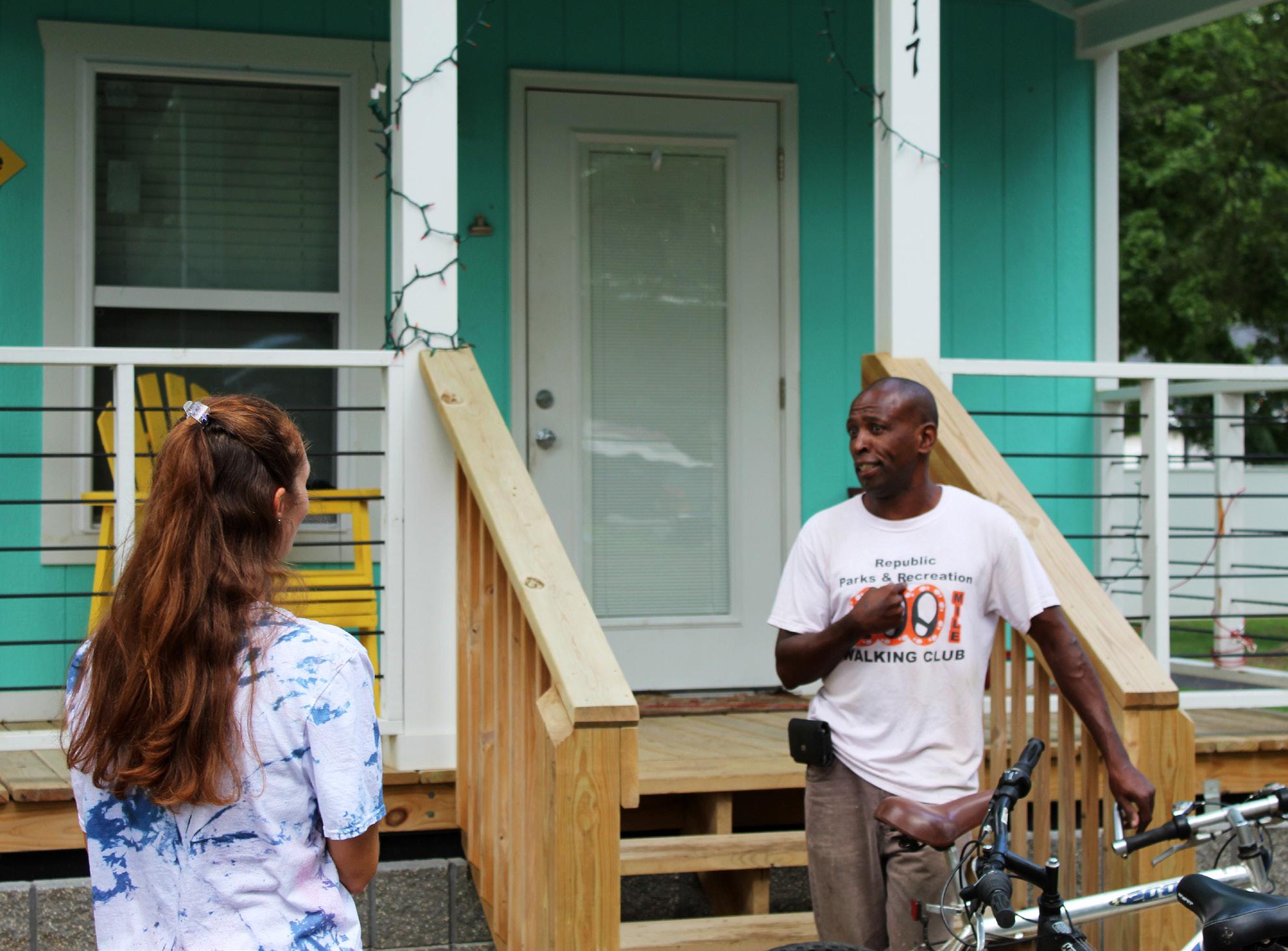
“I think it still could be a viable part of how you address people’s housing needs in the District of Columbia, especially with the encampments and some of the protocols that they’ve been putting in place,” Warren said.
The District conducts between 70 and 100 encampment engagements every year, discarding waste from sites and closing some of them permanently, displacing residents.
For Warren, building a tiny home community in itself would be insufficient in addressing the needs of helping people move into stable housing. He said he believes it is crucial for housing providers to think about the inclusion of supportive services, including case management and peer support. These services, he said, can help ease the transition people make from living in shelters or on the street to living in a tiny home.
Because of spatial issues, a tiny home community would be a more viable option in Maryland or Virginia, but Warren doesn’t
want to see people having to uproot from their communities in order to access one.
Klaus Philipsen, an architect and urban designer based in Baltimore and a former Regional and Urban Design Committee member in D.C., agreed that tiny home villages are not best suited for the District.
“From an urban design perspective, a village of tiny homes is not necessarily something that fits right into the urban fabric of a city like D.C., where there are very few vacant lots because the demand for development is so high that every last corner gets developed,” Philipsen said.
Philipsen explained the spectrum of tiny home projects ranges from tent communities to full homes that are a smaller size, like Eden Village. He said resident autonomy is important.
“A lot of the acceptance is also to deal with the services, the wraparound services, that are provided and the oversight, but it would be kind of nice if there was also some kind of self-policing going on in these villages and some autonomy in their governance,” Philipsen said.
Accessory dwelling units are a potential answer
Greg Cantori, the former president and CEO of Maryland Nonprofits, is a tiny home enthusiast, working to make tiny homes a more widespread solution in Maryland. He lives in a 39-foot-long boat “in the best spot in Annapolis” with his wife and two dogs.
Cantori sees many issues with the tiny home village model.
“My biggest concern is that it segregates — it brings back the whole problem of segregation,” Cantori said. “I always think that you have sort of an unhealthy neighborhood when you can point to a community and say, ‘That’s where the poor live. That’s where the rich live.’”
Cantori said he believes the best and most sustainable option is for homeowners with extra land to allow tiny homes on their
8 // STREET SENSE MEDIA // OCTOBER 26 - NOVEMBER 1, 2022 NEWS
Lymon Sanderson stands in front of his tiny home in the second Springfield Eden Village talking with a volunteer. Photo by Hannah Loder
property for people to rent or own. This is a new solution facing issues in other areas because of local laws.
In D.C., this type of housing is called an accessory apartment.
The District has explored various strategies in recent years to address the affordable housing crisis, like using inclusionary zoning to spur the development of mixed-income housing, but accessory apartments could offer a new way ahead.
In the past year, Maine passed a law designating tiny homes as single family dwellings, effectively eliminating barriers for tiny homes as solutions to homelessness. Cantori said he hopes to see this type of legislation passed in more states.
According to zoning in D.C., accessory apartments are only permitted in residential zones or R zones, limiting where they can be located in the city. In order to establish an accessory apartment on their property, the owner must get approval from the Department of Consumer and Regulatory Affairs by obtaining a special license and passing an inspection.
Even though there are challenges to this solution, Cantori is dedicated to making it a more accessible option.
“I’ve even had friends mention, ‘Oh, I haven’t been in that bedroom in months.’ And I’m thinking, ‘Why do you have an extra bedroom they’re not using? What kind of waste of space is that?’” Cantori said. “There’s no shortage of housing — there’s a shortage of the will to allow the use of that housing. That’s the problem.”
He explained that the biggest pushback to affordable housing projects comes from Not In My Backyard people, or NIMBYs. For accessory dwelling units to be a viable option, Cantori said that In My Back Yard people, or IMBYs, need to organize and welcome tiny homes onto their properties.
“In the meantime, people — the wealthy white homeowners — are hanging onto their little fiefdoms. They’re bringing up the drawbridges and putting out the moats and preventing anybody from moving in the neighborhoods,” Cantori said. “We’re finding ways to infiltrate them behind the lines and create these housing types without the NIMBYs realizing that’s happening to them until it’s too late.”
Backyard Homes Building Company builds detached accessory dwelling unit homes for clients in D.C. and Virginia. Tiny homes could be a solution in this area by modifying a model like this into affordable housing for people experiencing homelessness. An organization doing that is The Block Project in Seattle.
Cantori stressed that accessory dwelling unit legislation should unite all political parties.
“What I love about this is it means the arch liberals — the ones who say, ‘Hey, she has every right to live there’ — and the arch conservatives — which say, ‘Hey, you have every right to do what you want with the property without the government interfering’ — are on the same side of this issue,” Cantori said.
The way forward
Accessory dwelling units could be the way to keep people in D.C. and provide them with a tiny home.

On June 30, the D.C. Department of Housing and Community Development (DHCD) released a document requesting applications for the Residential Accessory Apartments Program (RAAP). This program, which was set to provide money to at
least 15 homeowners who seek to create accessory apartments on their existing properties by Sept. 30, is an effort by the District to lessen the financial burden on homeowners and developers to make their accessory apartments comply with the District’s requirements.
DHCD did not respond to requests for comment in time for publication.
The District defines a residential accessory apartment as a secondary residence that “has kitchen and bath facilities separate from the principal dwelling and may have a separate entrance.”
The money awarded through the RAAP is determined by income level, according to the document. Homeowners who have a Median Family Income (MFI) of 121% and above will be subject to an affordability covenant for their accessory apartments, meaning that the tenants must have an MFI of 60% or below.
The awardees of the program must complete their accessory apartments within 18 months of receiving the funds.
Through this program, the number of accessory apartments in the District will grow at least by 15. While the zoning and requirements can be complicated, the District already has access to this solution, which is more than many other cities.
“When I go through big suburban neighborhoods now, all I can think of is, ‘Oh my God, oh my God, that would be so great to turn into an accessory dwelling unit,’” Cantori said. “‘You could slip one in there and no one even notice.’ See, you start thinking this way, and I’ve been thinking this way for years now, and I can’t get it out of my head. There’s so much wasted space.”.
STREETSENSEMEDIA.ORG // 9
The tiny homes in Eden Village are painted bright colors. Photo by Hannah Loder
Alcohol is just as dangerous as drugs, and we should treat it that way
 JEFF TAYLOR
JEFF TAYLOR
Iwas watching an episode of American Pickers and they featured an old bootleg liquor still. They talked of the history of the period, and it occurred to me that the bootleggers were the drug manufacturers and dealers of their time.
And yet to this day, we can and should consider even lawful manufacturing and distribution of alcohol to be a drug operation on a massive scale.
For those not familiar with how many Narcotics Anonymous (NA) meetings are structured, a typical 90-minute gathering begins with random volunteers in attendance reading organizational pieces of literature. These readings are an important aspect of NA and Alcoholics Anonymous meetings.
The last paragraph of the NA reading called “How it Works” reads as follows: “Thinking of alcohol as different from other drugs has caused many addicts to relapse. Before we came to NA, many of us viewed alcohol separately, but we cannot afford to be confused about this.”

At this time it's common for most all attendees to say in unison, "Alcohol is a drug." And it's not unusual for one or more folks to emphatically add the word “period” at the end of that last sentence.
The reading concludes: “We are people with the disease of addiction who must abstain from all drugs in order to recover.”
My dear friend Alice was an addict. Her drug of choice for a significant period of time was crack cocaine. She also took a lot of cough and cold medicine over the years. She was taken to the emergency room several times after having taken as many
as 64, yes, sixty freaking four cough and cold pills. But it was the damn alcohol that eventually took her life. Legal, cheap, and readily available.
I'm not about to suggest that we revive Prohibition. We tried that already. But we do need to do something, don't we? Even if it's just a matter of attempting to influence the narrative and culture around alcohol. Call it out loudly and consistently as being a drug. And not just any drug. It's a drug that kills and the statistics bear that out. An estimated 95,000 people die from alcohol-related deaths annually, making alcohol the third leading cause of preventable death in the United States.
But it's not just about alcohol. Or opioids or any other dangerous drug. It's about the disease of addiction. And it's very much about the internal pain that drives people to self medicate. My friend Alice used and boozed to cope with her chronic emotional and psychological pain. If we were able to further break down the stigmas around mental health and other reasons that cause so many people to use and abuse alcohol and other drugs then I believe that would go a long way toward saving countless lives.
Perhaps creating a stigma around alcohol as being a drug just like crack or opioids could help? I honestly don't know what the solution is, but we do need to go about trying to find a solution. Our sense of humanity and decency demands it. Real lives depend on it.
But it seems to me a good place to start might be calling the alcohol industry what it really is: A drug business.
Jeff Taylor is an artist and vendor with Street Sense Media.
It’s urgent to get people housed for the winter, and the DC government is only half doing its job
AMINA WASHINGTON
Ibelieve that Washington, D.C. should be more able to distribute more vouchers. There are so many homeless people in D.C., and I believe that if homeless encampments and outreach programs reach out more, more vouchers can be distributed, and we all can use these funds.
Nonprofits such as Miriam’s Kitchen have reached out to many people. I also received a home and am still waiting on a voucher. My progress is ongoing, and my goal is to definitely get as many homeless people off of the street as possible.
Still, some people are being discriminated against by some of the programs, and that is slowing down the progress of getting people housing they need. Also, the Service Prioritization Decision Assistance Tool (SPDAT) program, which assesses and prioritizes the needs of people experiencing homelessnes, tells each of us our status of applying for housing. The SPDAT is important because it gives the homeless community an opportunity to be housed and I believe that it is fair to give people the housing they need.
What I’ve seen, which is great, is that the housing programs are targeting homeless, disabled and elderly people at risk. But there has been a lack of consistency in keeping up with clients and their whereabouts. This slows the process of getting housed.
For example, the tent community and people sleeping on the streets — it takes months and sometimes a couple of years to receive a voucher. But I believe the process can be speeded up. I know for a fact that it takes time, but when the goal for receiving a voucher is reached, it is worth it.
Instead of helping everyone with vouchers, the D.C. authorities shut down a tent city at Union Station, pushing people out of their only homes forcing them to discard their property and knock down tents. I personally believe that people who are being forced out of their “homes” on the street should get a chance to access public housing and be able to use programs that they say are available.
Park police, MPD and other law enforcement intentionally set people living on the street up by messing with them. I believe that during extreme weather seasons housing should be
rapid and faster. I’ve seen quite a few people get housing but it isn’t enough. We can’t stop here. We have to keep going until all people are off the streets. The D.C. government has so much to offer and the message shold be passed on instead of picking on people and shutting down their tents. The government should be helping the people they see out there. Lift them all up instead of putting them down.
I think the D.C. government is halfway doing its job. There is more work to do before we lose more lives due to something that could have and still can be prevented. Women with kids and pets, older people and sick people have passed away due to homelessness and lack of health care, sleeping on sidewalks without cover, and hunger. This is preventable only if the message could be put out there more.
Homeless people should protest and let the government know we need housing as soon as possible. Winter is coming and we can’t wait any longer.
OPINION 10 // STREET SENSE MEDIA / OCTOBER 26 - NOVEMBER 1, 2022
Amina Washington is an artist and vendor with Street Sense Media.
Photo by Artem Labunsky // Unspalsh
Halloween
JACKIE TURNER Artist/Vendor
Halloween is a uniquely odd and spooky holiday made up of a number of traditions and superstitions. It’s a combination of different cultures around the world. One of the origins is the ancient Celtic festival of Samhain, where people used costumes to ward off roaming ghosts in the eighth century. The Celtics and the Druids wore animal heads and skins and danced around bonfires. Also in the eighth century, Pope Gregory III changed All Saint’s Day from May 13 to Nov. 1 and incorporated some of the traditional Samhain into the Catholic holiday, hoping to replace a popular Pagan tradition.
The practice of trick-or-treating for candy could be because, in Europe, children would dress in costume and call on their neighbors to see if they could guess who they were. The children were rewarded with food and theater. Bobbing for apples can be traced to the Roman invasion of the Celtic territory and the celebration of Pomona, the Roman goddess of fruit and trees.
Halloween
SYBIL TAYLOR Artist/Vendor

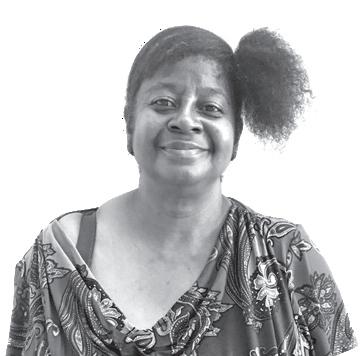
Ghouls and goblins, thrills and chills, ghosts and wolves. Witches and black cats make wishes during the full moon and cast spells. Trick-or-treaters with their Halloween bags and costumes of all sorts. Who will you be? It’s always a surprise — who’s behind the masks? Lots of candy apples and Halloween treats. Do you dare visit a graveyard or a haunted house? Be haunted, afraid and scared. The wolves howl "Happy Halloween!”
That time of the year
ANTHONY CARNEY Artist/Vendor


It’s that time of the year to fall back. The leaves are changing to beautiful colors such as yellow, green, orange and brown. Halloween. It’s that time of the year to dress up in costumes. Trick or treat. Pumpkin pie with whip cream and cocoa. Let’s enjoy the weather. And watch out for those kids on Halloween!
Connection


 JEN MCLAUGHLIN Artist/Vendor
JEN MCLAUGHLIN Artist/Vendor
There are so many organizations in D.C. that do great work in housing, education and public safety.
You can’t cross the street if the street light is broken. You can’t tell an unhoused neighbor to get a job with a third-grade education. All advocates in the District are connected in some way.
Marvin Gaye remix
REDBOOK MANGO Artist/Vendor
My cup, my lock
My keyboard, my duck
My computer, my hut
My mom said if you See me and a bear fighting Don’t help me, help the bear What the f—
Halloween
ROCHELLE WALKER Artist/Vendor
Halloween is when the witches go riding and black cats look like bats. When the color is orange and the pumpkins’ faces light up. It’s can be a teachable moment. It’s the night before Nov. 1 and children like to dress up. Now I know that Oct. 31 is Halloween night. It’s a holiday. You can run but you cannot hide. It’s Halloween. When the moon whispers it’s near trick-or-treating. Give me a trick and I give you some treats. It is time




Back in the community
RONALD SMOOT Artist/Vendor
I am back in the community after seven months in the D.C. jail. It is a blessing to be back. I need to get a job and get to work so I can take care of bills and other things — like my Pepco bill. My water bill is covered because I don’t have hot water now. I have to take cold showers to stay clean nowadays. It’s also a little cold in my apartment.


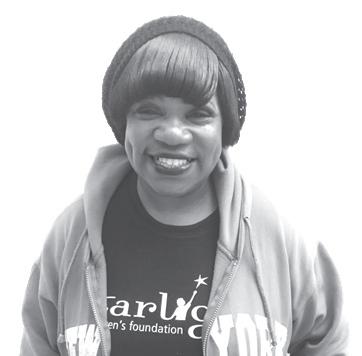
I have to go to court in November because my landlord is pursuing me for a $55 charge. Instead of going to court, I feel like I should be working so I can make enough money to pay off the charge. My lawyer is trying to get me to move with my housing voucher. I would be so happy if I could move.
I’m asking God to help me get myself together, so I can be happy.
The House of the Rising Sun by The Animals Thriller by Michael Jackson Monster Mash by Bobby Pickett Witch's Brew by Darla Hood
Dear Street Sense Media
WARREN STEVENS Artist/Vendor
Fall is here. The leaves are already turning colors. The wind is blowing. The weather is beautiful. Young people are getting dressed up for Halloween, going to parties and celebrating the holiday. I used to dress up for Halloween parties. The kids will be going trick or treating.
The Artshow was excellent. They had a vendor who played guitar. And Queenie reading the poem. They had a food truck in front and drinks.
Thanksgiving and Christmas are around the corner. Stay safe wearing a face covering. It is cold weather time.
Us against the world
ERIC GLOVER Artist/Vendor
The world is a big place to live in. Sometimes I wonder how it looks from the outside. Well, sometimes it can be fun but most of the time it does get lonely, not going to lie. But you know the best part about being against the world is you can focus on yourself and become what you want to be. Not what people want you to be, but become more of your true self and you make your own rules. Standing up for yourself is the strongest thing you can do — if you don’t stand for anything you will fall for anything. My favorite thing to say is you can’t change the world unless you change yourself. I know I am special and I am not going to let nobody take that away — when you give rise to that which is within you, what you have will save you. If you do not give rise to it, what you do not have will destroy you.
Shake up
MICHELE ROCHON Artist/Vendor
Falling into autumn is refreshing, ushering out the hot muddy days and entering into cool breezes.
Walking through downtown Washington, D.C. near 14th St. NW and observing the beautiful hanging plants in pink and white, replete with manicured storefronts where grass is always cut and there is no trash — falling into autumn — a change in season’s is an opportunity to gain a new fresh perspective. God shakes up our world in this region by the four seasons — orange, yellow and red leaves.
Overcoming cruelty and bullying while responding to trolls and critics: Part two
JEFFERY MCNEIL Artist/Vendor
Although I never tried hiding my past, plenty of trolls and critics love to remind people who read my columns that I was once a homeless crackhead.

I guess the purpose of a troll bringing up my past drug use and homelessness is to cancel and discredit me. Even as I turned the page from those dark days and have written a book, created blogs, been published in the Washington Examiner, Big Issue, Washingtonian and American Compass, been invited to the White House, angry trolls still love to remind me that I was once a homeless guy who smoked crack.
Nothing is off limits to these self-proclaimed “compassionate” trolls. They have attacked my personal struggles with ADD (Attention Deficit Disorder) as proof that I’m mentally ill. But, instead of laying on my pillow crying because of these mean-spirited people, I put myself in the company of Abe Lincoln, Vince Lombardi and Edgar Allan Poe. They used their insanity to do something these trolls will never accomplish.
A message to my critics: your cruelty will never deter me.
I know the root cause of their hate. I’m a Black man that doesn’t sip from the well of victimhood. I have been called the n-word and was once attacked by Neo-Nazis. I had a policeman arrest me for having a white woman in my car. But, instead of being aggrieved and looking for reparations, I moved on and forgave them.
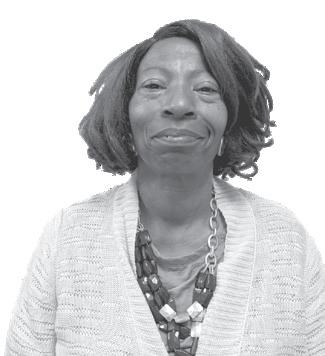


Unfortunately, the same trolls, angered by racism, have become no different than the bigots they attack.
Really? I’m collaborating with white supremacists because I don’t vote for Democrats? Did you know Joe Biden’s best friend in the Senate was Robert Byrd, a former Exalted Cyclops of the KKK?
How dumb are these trolls? Everything from slavery to the forced removal of Native Americans from their lands, Jim Crow, segregation, lynching and denying African Americans the right to vote had also involved Democrats! If you hate racism, then why would you support people that hire and fire people based on their skin tone and gender?
While being attacked by trolls hiding behind a computer doesn’t bother me, I find it bizarre how trolls try to take the moral high ground with a straight face. An angry troll likes to post a column that I’ve written about my past as if this will make me lose followers.
Haven’t the champions of the homeless argued that drug addiction and mental illness are not the root causes of homelessness but it’s instead a lack of affordable housing? Still, when no one is looking, they love to trash me about my past experience of once being homeless.
I”m not intimidated by the trolls’ viciousness, nor do their temper tantrums move me.

I’m not put on this Earth to make friends, and it’s time to tell these trolls the day of reckoning is coming. To the trolls, I came to DC with absolutely nothing in my pocket. I’m not ashamed of my past. If anything, I’m tough. If people want to mock me for selling Street Sense, keep it moving. The last time I looked, I’m not committing a crime or breaking the law. I spend little time with people who don’t support me, so I won’t lose any sleep about how you feel about me. Nobody pays anything for me. I sold newspapers, managed to save my money, and live in the country’s wealthiest ZIP code, so eat that!
I’m probably the only guy in D.C. that washed dishes and bussed tables, sometimes for as little as four hours a week, and still managed to pay for a $ 1,000-a-month apartment. I never sat around blaming others or playing the victim. No matter what obstacles came my way, I said I would conquer them.
Why do you say one thing in front of your liberal buddies about how you care about Black and brown people, then while nobody’s looking to try to kneecap me for selling Street Sense?
They can’t stand that I am winning, and they are behind their computer envying me. Yes, I was a homeless crackhead. So what? Yes, I lived in a shelter, but now I live in a wealthy zip code, selling newspapers and parttime bartending. I like to thank these trolls for attacking me because it makes me more determined to defeat them.
Team spirit togetherness
BRIANNA BUTLER Artist/Vendor
In the midst of a cool evening of fun and creativity there was a high-energy competition of who can make the best dish. The contest was held in a place with sparkly blue walls. The prize was $100, a t-shirt and bragging rights. There were five teams — red, blue, green, pink and yellow. All teams were ready for this competition, prepared with trays and toothpicks.
The red team created dipped caramel nugget doughnuts, fried and topped with cherries. The blue team made lumpia and spring rolls — sheets of dough filled with beef and vegetables. The green team made chicken rolls with slaw. The pink team created sweet ‘n sour spicy spring chicken rolls. The yellow team made gyros dipped in tzatziki sauce.
People were coming from all around — a much bigger crowd came than expected.
12 // STREET SENSE MEDIA // OCTOBER 26 - NOVEMBER 1, 2022 ART
Surface
 CARLOS CAROLINA Artist/Vendor
CARLOS CAROLINA Artist/Vendor

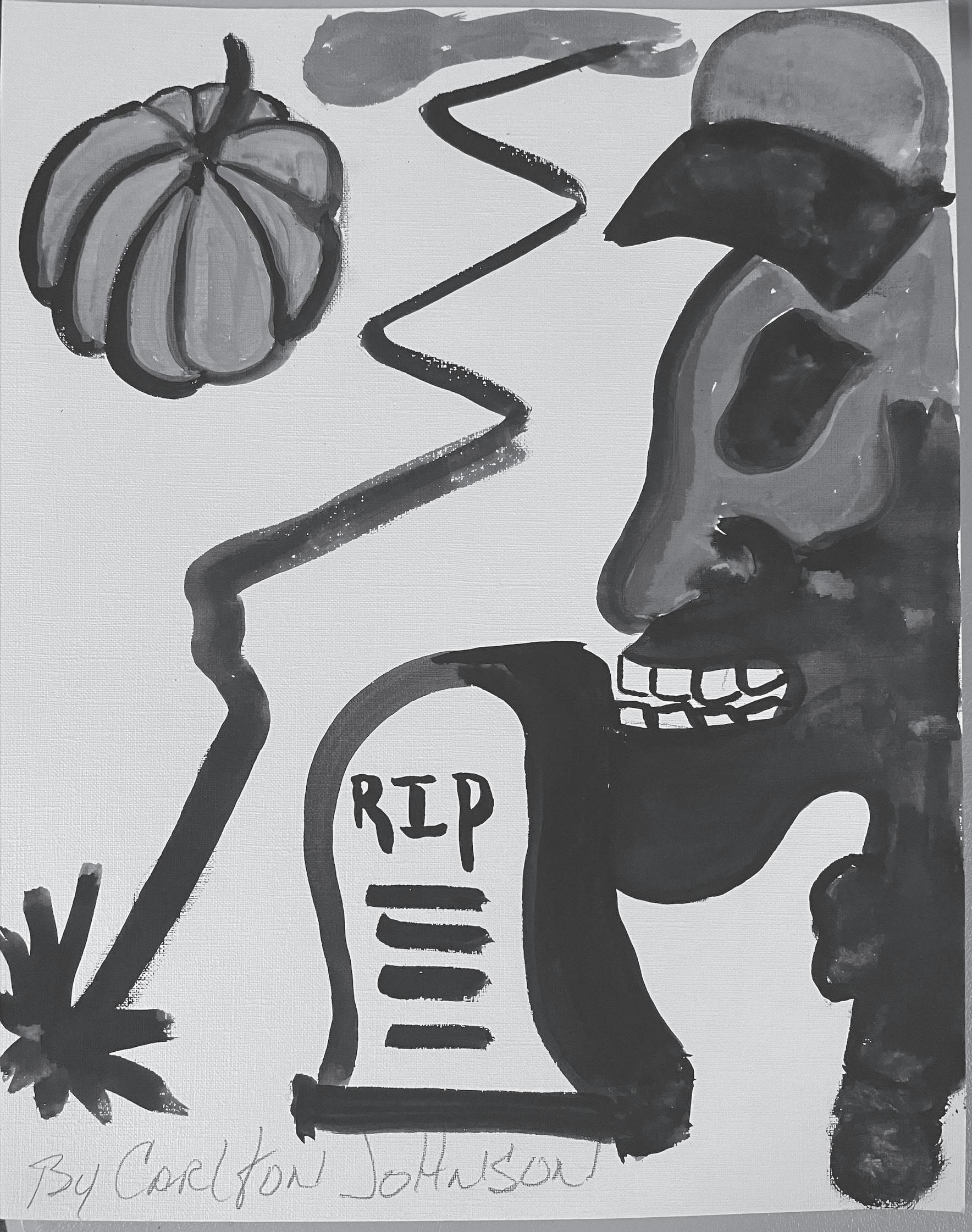
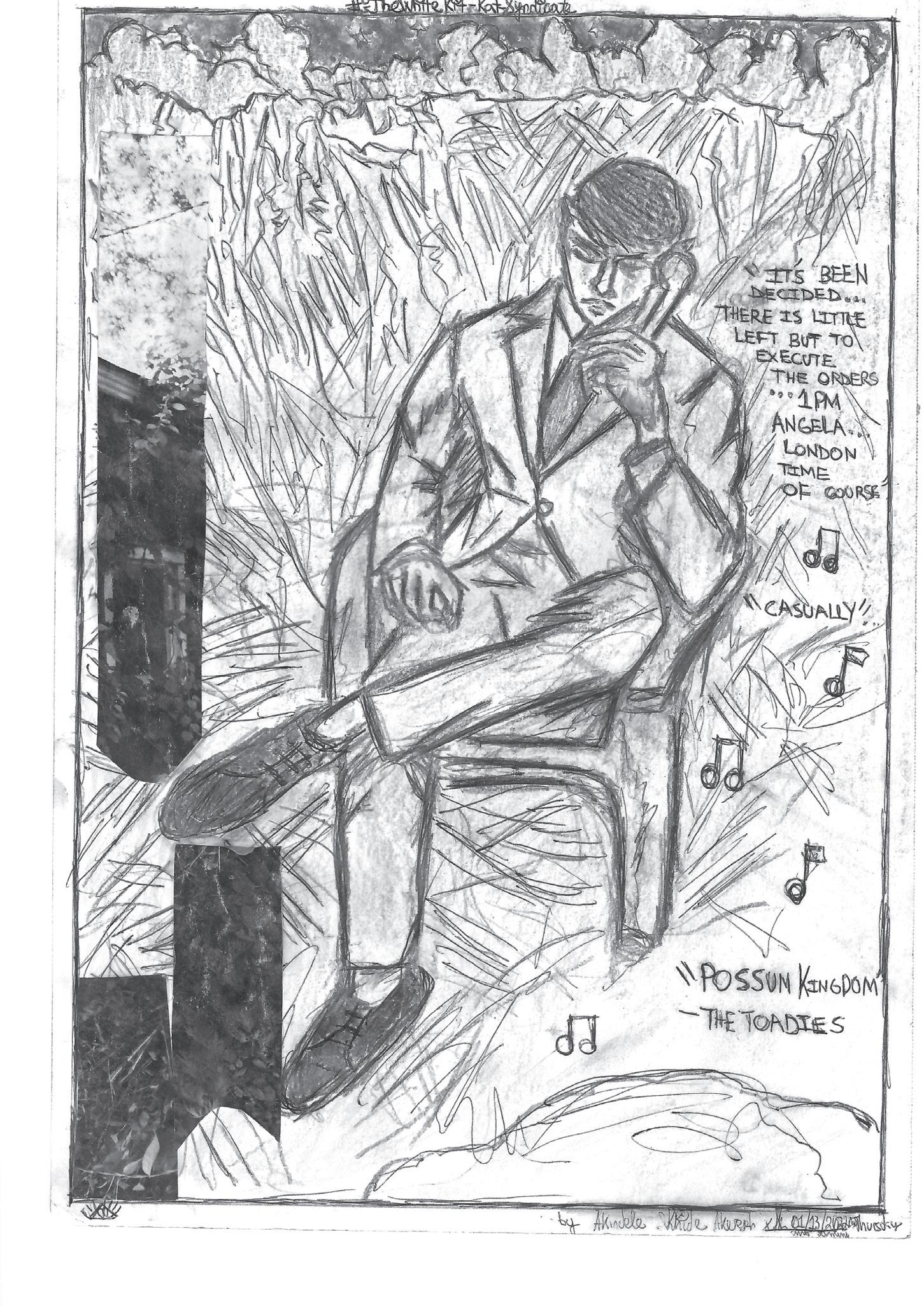
I knew since I was a young man I was a blessed man; I’m one of his soldiers.


Though at times it gets Hard to hold my composure, And show you without Saying “I told you”
Got to stay humble Stay focused
And stand strong with pride; I just want to thank God
Once you understand everything You go through is to make you a better you, Stay true!
Let Him work! Have faith

One thing’s for sure, two thing’s For certain
As long as you keep your faith, You’ll know your purpose Know you’re needed Know you’re worth it
You’re for sure, that that’s for certain So surface!
STREETSENSEMEDIA.ORG // 13
AKINDELE AKEREJAH Artist/Vendor
CARLTON JOHNSON Artist/Vendor
COREY SANDERS Artist/Vendor
COMMUNITY
Housing/Shelter Vivienda/alojamiento Case Management Coordinación de Servicios
SHELTER HOTLINE
Línea directa de alojamiento (202) 399-7093
Education Educación Food Comida
Academy of Hope Public Charter School 202-269-6623 // 2315 18th Place NE aohdc.org
Bread for the City - 1525 7th St., NW // 202-265-2400 - 1700 Good Hope Rd., SE // 202-561-8587 breadforthecity.org
Calvary Women’s Services // 202-678-2341 1217 Good Hope Rd., SE calvaryservices.org
Catholic Charities // 202-772-4300 924 G St., NW catholiccharitiesdc.org/gethelp
Central Union Mission // 202-745-7118 65 Massachusetts Ave., NW missiondc.org
Charlie’s Place // 202-929-0100 1820 Connecticut Ave., NW charliesplacedc.org
Christ House // 202-328-1100 1717 Columbia Rd., NW christhouse.org
Church of the Pilgrims // 202-387-6612 2201 P St., NW food (1-1:30 on Sundays only) churchofthepilgrims.org/outreach
Community Family Life Services 202-347-0511 // 305 E St., NW cflsdc.org
Community of Hope // 202-540-9857 communityofhopedc.org
Covenant House Washington 202-610-9600 // 2001 Mississippi Ave., SE covenanthousedc.org
D.C. Coalition for the Homeless 202-347-8870 // 1234 Massachusetts Ave., NW dccfh.org
YOUTH HOTLINE Línea de juventud (202) 547-7777
Health Care Seguro Employment Assistance Assitencia con Empleo
Father McKenna Center // 202-842-1112 19 Eye St., NW fathermckennacenter.org
Clothing Ropa Transportation Transportación
DOMESTIC VIOLENCE HOTLINE
Línea directa de violencia doméstica 1-800-799-7233
Legal Assistance Assistencia Legal Showers Duchas
BEHAVIORAL HEALTH HOTLINE Línea de salud del comportamiento 1-888-793-4357
Laundry Lavandería
JOB BOARD
Dishwasher Marriott // 999 9th St. NW
Samaritan Ministry 202-722-2280 // 1516 Hamilton St., NW 202-889-7702 // 1345 U St., SE samaritanministry.org
Full-time
Food and Friends // 202-269-2277 (home delivery for those suffering from HIV, cancer, etc) 219 Riggs Rd., NE foodandfriends.org
Friendship Place // 202-364-1419 4713 Wisconsin Ave., NW friendshipplace.org
Georgetown Ministry Center // 202-338-8301 1041 Wisconsin Ave., NW georgetownministrycenter.org
Loaves & Fishes // 202-232-0900 1525 Newton St., NW loavesandfishesdc.org
Martha’s Table // 202-328-6608 marthastable.org 2375 Elvans Road SE 2204 Martin Luther King Ave. SE
Miriam’s Kitchen // 202-452-8926 2401 Virginia Ave., NW miriamskitchen.org
My Sister’s Place // 202-529-5261 (24-hr hotline) mysistersplacedc.org
N Street Village // 202-939-2076 1333 N St., NW nstreetvillage.org
New York Avenue Shelter // 202-832-2359 1355-57 New York Ave., NE
Samaritan Inns // 202-667-8831 2523 14th St., NW samaritaninns.org
Sasha Bruce Youthwork // 202-675-9340 741 8th St., SE sashabruce.org
So Others Might Eat (SOME) // 202-797-8806 71 O St., NW some.org
Thrive DC // 202-737-9311 1525 Newton St., NW thrivedc.org
Unity Health Care 3020 14th St., NW // unityhealthcare.org
- Healthcare for the Homeless Health Center: 202-508-0500
- Community Health Centers: 202-469-4699
1500 Galen Street SE, 1251-B Saratoga Ave NE, 1660 Columbia Road NW, 4414 Benning Road NE, 3946 Minnesota Avenue NE, 765 Kenilworth Terrace NE, 3240 Stanton Road SE, 3020 14th Street NW, 1717 Columbia Road NW, 1313 New York Avenue, NW BSMT Suite, 425 2nd Street NW, 4713 Wisconsin Avenue NW, 1333 N Street NW, 1355 New York Avenue NE, 828 Evarts Place NE, 810 5th Street NW, 850 Deleware Avenue SW, 65 Massachusetts Avenue NW, 4515 Edson Place NE
Washington Legal Clinic for the Homeless 1200 U St., NW // 202-328-5500 legalclinic.org
The Welcome Table // 202-347-2635 1317 G St., NW. epiphanydc.org/thewelcometable
Whitman-Walker Health 1525 14th St., NW // 202-745-7000 2301 MLK Jr. Ave., SE // 202-797-3567 whitman-walker.org
Last updated May 25, 2022
For further information and listings, visit our online service guide at StreetSenseMedia.org/service-guide
Operate and maintain cleaning equipment and tools and clean the kitchen, tables, tools, knives, and equipment.
REQUIRED: N/A
APPLY: tinyurl.com/marriott-dishwasher
Custodial Services Worker Aramark, Georgetown University // 3700 O St. NW
Full-time
Maintains a clean and orderly environment, follows procedures for storage and disposal of trash and reports maintenance concerns via work order requests to appropriate personnel.
REQUIRED: N/A
APPLY: tinyurl.com/custodial-georgetown
Restaurant Team Member
Chipotle // 2600 Connecticut Ave NW
Part-time
Looking for team members who are interested in learning how to cook and willing to work alongside others in a food preparation environment.
REQUIRED: N/A
APPLY: https://tinyurl.com/chipotleteams
Hiring? Send your job postings to editor@StreetSenseMedia.org
STREETSENSEMEDIA.ORG // 15
SERVICES
All services listed are referral-free
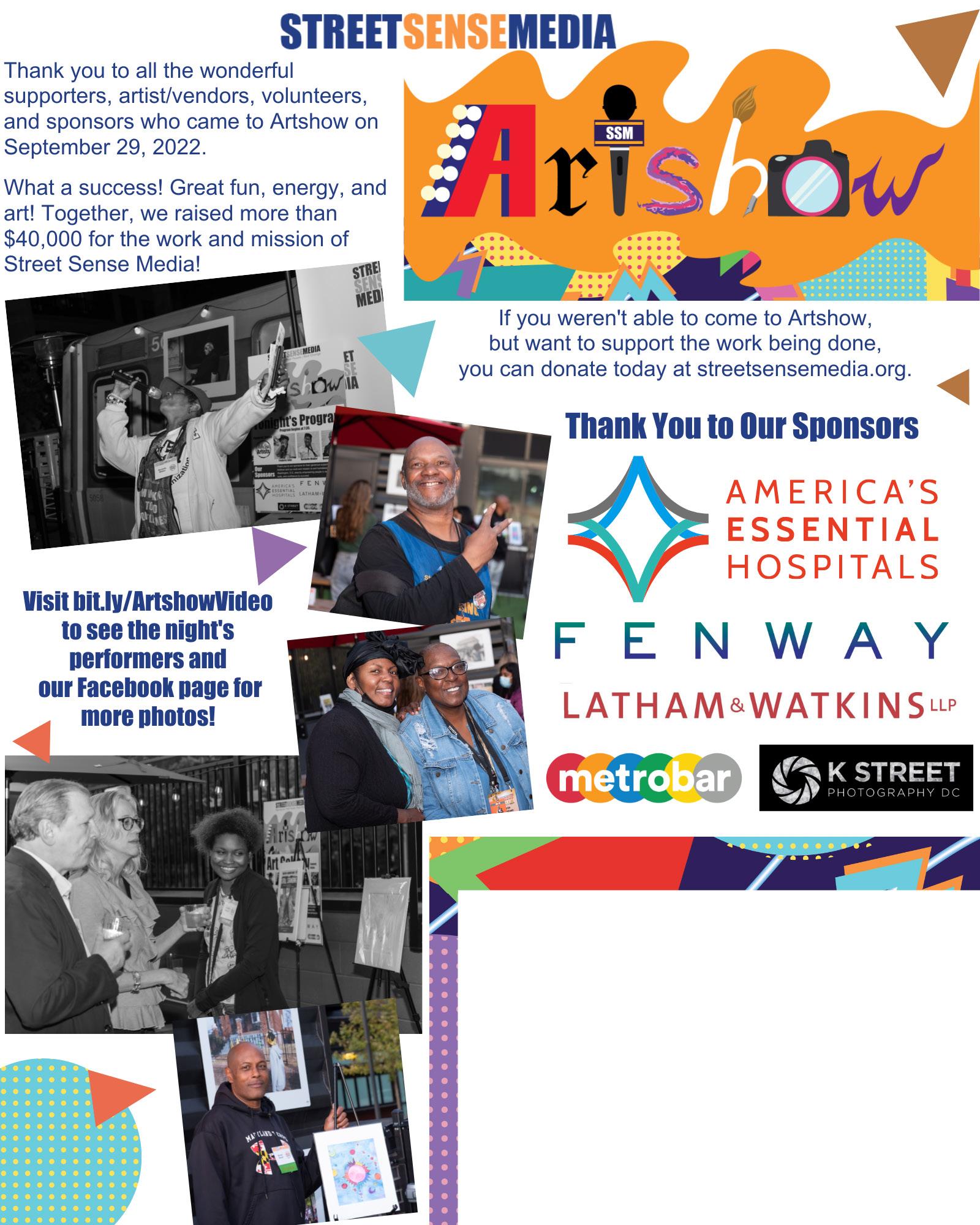

OCT. 26 - NOV. 1, 2022 | VOLUME 19 ISSUE 49 From your vendor, Thank you for reading Street Sense! WWW.INSP.NGO NO CASH? NO PROBLEM. WE HAVE AN APP! SEARCH “STREET SENSE” IN THE APP STORE










 BIRTHDAY
BIRTHDAY







 JEFF TAYLOR
JEFF TAYLOR







 JEN MCLAUGHLIN Artist/Vendor
JEN MCLAUGHLIN Artist/Vendor












 CARLOS CAROLINA Artist/Vendor
CARLOS CAROLINA Artist/Vendor







